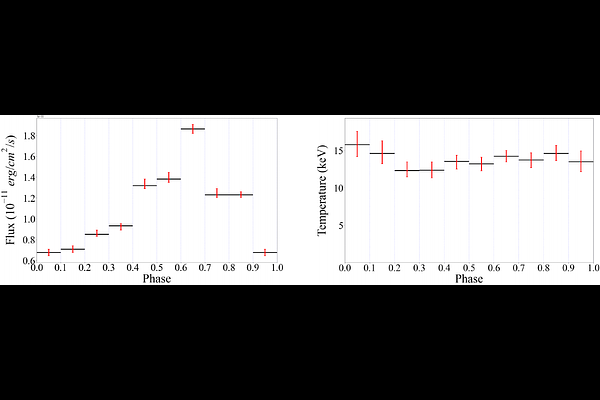NuSTAR broadband X-ray observation of EF Eri following its reawakening into a high accretion state

NuSTAR broadband X-ray observation of EF Eri following its reawakening into a high accretion state
Luke W. Filor, Kaya Mori, Gabriel Bridges, Charles J. Hailey, David A. H. Buckley, Gavin Ramsay, Axel D. Schwope, Valery F. Suleimanov, Michael T. Wolff, Kent S. Wood
AbstractWe present the first $\textit{NuSTAR}$ X-ray observation of EF Eri, a well-known polar system. The $\textit{NuSTAR}$ observation was conducted in conjunction with $\textit{NICER}$, shortly after EF Eri entered a high accretion state following an unprecedented period of low activity lasting 26 years since 1997. $\textit{NuSTAR}$ detected hard X-ray emission up to 50 keV with an X-ray flux of $1.2\times10^{-10}$ ergs s$^{-1}$ cm$^{-2}$ ($3\rm{-}50 keV$). Folded X-ray lightcurves exhibit a single peak with $\sim65\%$ spin modulation throughout the $3\rm{-}50$ keV band. We found no evidence of QPO signals at $\nu = 0.1\rm{-}100$ Hz with an upper limit on the QPO amplitude below $5\%$ ($90\%$ CL) at $\nu \sim 0.5$ Hz where the optical QPO was previously detected. Our 1-D accretion column model, called ${\tt MCVSPEC}$, was fitted to the $\textit{NuSTAR}$ spectral data, yielding an accurate WD mass measurement of $M = (0.55\rm{-}0.58) M_\odot$. $\texttt{MCVSPEC}$ accounts for radiative cooling by thermal bremsstrahlung and cyclotron emission, X-ray reflection off the WD surface, and a previously constrained range of the accretion column area. The derived WD mass range is in excellent agreement with the previous measurement of $M = (0.55\rm{-}0.60) M_\odot$ in the optical band. This demonstrates a combination of broadband X-ray spectral analysis and the ${\tt MCVSPEC}$ model that can be employed in our ongoing $\textit{NuSTAR}$ observation campaign of other polars to determine their WD masses accurately.